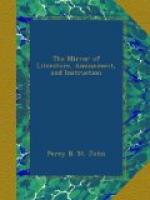But there is another distinctive mark in those veteran French soldiers, whom we see conveyed into Bruxelles, wounded and prisoners. They seem to retain a ferocious expression, even at the moment of sinking into the feebleness of death, and while every human succour is rendering to them. They cast a furtive glance around, and their countenances indicate all the horror of their minds at their late reverses, and to be thinking less of the bodily pains they are enduring, than of their incapability to revenge themselves upon their victors! Such was the scene exhibited this morning on the steps of the hotel opposite to my apartment.
* * * * *
THE PUBLIC JOURNALS.
* * * * *
JULIUS CAESAR—HIS SUPERSTITION.
[A curious paper, entitled The Caesars, will be found in Blackwood’s Magazine for the present month. It is full of attractive lore, and contains, to our thinking, a masterly estimate of the actual character of Caesar. It displays very considerable learning, research, and knowledge of life, or that treasure which we call world-knowledge. It is not a cut-and-dry classical character “by way of abstract,” but such a whole-length portrait as we wish to see drawn of every great man of antiquity, respecting whose merits mankind are, as it were, still groping in comparative ignorance or misconception. We quote two interesting passages—one embodying the personal portrait of Caesar—the other the superstitious weakness commonly attributed to him.]
In person, Caesar was tall, fair, and of limbs distinguished for their elegant proportions and gracility. His eyes were black and piercing. These circumstances continued to be long remembered, and no doubt were constantly recalled to the eyes of all persons in the imperial palaces, by pictures, busts, and statues; for we find the same description of his personal appearance three centuries afterwards, in a work of the Emperor Julian’s. He was a most accomplished horseman, and a master (peritissimus) in the use of arms. But, notwithstanding, his skill in horsemanship, it seems that, when he accompanied his army on marches, he walked oftener than he rode; no doubt, with a view to the benefit of his example, and to express that




